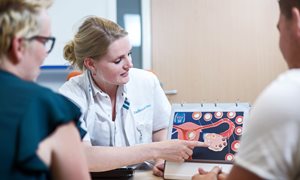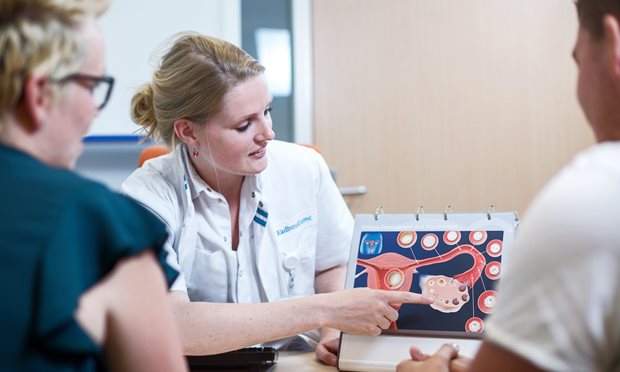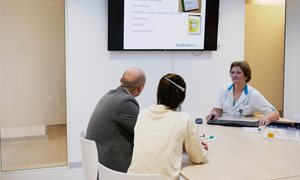

Do you have a question?
On this page you can find frequently asked questions about our examinations and treatments. If you can't find your question here, please contact us.FAQ reproductive medicine

Before treatment
-
Many women continue to suffer from spotting or brown discharge after starting the pill. This is not dangerous. Our advice is to continue with the pill and follow the treatment schedule as agreed. In case of severe blood loss or menstruation, please contact us. After switching to Decapeptyl, some bleeding usually occurs. This can be different than normal menstruation.
-
In general, IVF treatments can begin again when your child has reached the age of one year. But other agreements can also be made in consultation with your physician. If you have not been in treatment for more than a year, you will need a new referral from your GP or attending physician.
-
This is possible for patients who previously had three treatments at our hospital or elsewhere. Usually the health insurer does not reimburse the costs of these treatments unless you have supplemental insurance for this or if special agreements have been made with you (this is stated in your file).
-
Our laboratory has a substantial expertise in male infertility and reduced sperm quality. The sperm test at our lab can provide additional information for diagnosis or for decisions about treatment.
-
At Radboud university medical center, all types of ICSI treatments are done, even if very little sperm is available. TESE and PESA treatments for men have been done at Radboud university medical center for several years. Additionally, on the day the ovarian puncture of the woman takes place, an acute TESE or PESA can be performed if indicated. This can only be done on working days (link PESA-TESE treatment).
-
Our clinic does not have a sperm bank with donor sperm. In consultation with staff, we can store sperm for your own fertility treatment.
-
On the website of the Dutch National Institute for Public Health and the Environment ( RIVM) you can find all current information about infectious diseases and childhood diseases. On this website you can also read about the possible effects of these diseases during treatment and during pregnancy. In certain cases, treatment may have to be postponed. Go to the home page of the RIVM, then click on Topics.
-
Yes, that is possible. As far as we know, the flu shot is not harmful to pregnant women or the unborn child. Pregnant women from the target group have been receiving flu shots for decades.
For up-to-date recommendations, check the RIVM website. -
You are eligible for fertility testing and treatment up to an age of 43 years. However, this only the case when testing and treatment are medically advisable.
Embryos that were frozen before your 43rd birthday can be used until you are 50 years of age.
All patients at Radboud university medical center who have previously undergone treatment at our department and who have good ovarian reserve can continue treatments at their own expense after their 43rd birthday.
Team consultation must take place beforehand.
For questions and more information about a possible reimbursement, please contact your health insurer. -
Healthy weight increases the likelihood of becoming pregnant and of having an uncomplicated pregnancy and a healthy baby. Due to overweight or underweight, fertility testing or treatment is sometimes not technically feasible or involves too many risks or possible complications. For this reason, your attending physician may advise you to lose or gain weight. Depending on your weight and situation, your personal treatment plan will be adjusted accordingly. We do not initiate treatment for women with a BMI above 40.
-
In case of possible exposure, we advise women to postpone pregnancy for at least one month after returning, even if you have not had any disease symptoms.
We advise men to use a condom for up to two months after returning, even if you have not had any disease symptoms. This is because the ZIKA virus can be transmitted via sperm.
For up-to-date recommendations, please check the RIVM website. -
The medical staff cannot give you information about these costs. You can request information about the reimbursements for your treatment from your health insurer. Information about the costs of all treatments at Radboud university medical center can be found on the website under Healthcare Costs.
-
The first three IVF/ICSI treatments, including all cryotherapy treatments, are reimbursed by insurance. Check with your health insurer if more treatment attempts are reimbursed. Do you have to pay for cryotherapy treatment yourself? See the information on our website under Healthcare Costs.
-
Unfortunately this is not possible, but we can give you a copy of the agreements made at the admission desk.
-
We are not allowed to cooperate with treatments performed abroad. This also applies to an ultrasound for measuring the endometrial thickness. In the Netherlands it is forbidden to use anonymous donors as part of an egg donation treatment. But this allowed in other countries. The Department for Reproductive Medicine therefore cannot cooperate with treatments that use anonymous donors.
We only treat patients from other centers if a cooperation agreement with Radboud university medical center is in place.

During treatment
-
You can ask urgent questions during nursing telephone consultation hours on weekdays between 8.00 AM and 9.00 AM. Call (024) 361 6644, choose 1, then choose 3. If necessary, the nurse can consult with the physician on the same day. For emergencies, we can be contacted on weekdays and weekends on the emergency phone number. Outside office hours you will be connected to the physician on duty.
-
Yes. On the day of the embryo transfer, you must also insert 3 x 2 vaginal capsules of Utrogestan.
-
Yes. The ovaries become enlarged during the stimulation period. This can cause a swollen lower abdomen, especially in the evening. Some women experience this as a ‘fuller feeling’. You may also experience a stinging sensation in the lower abdomen, especially on the sides. Are you nauseous? Then you should probably increase your fluid intake. We recommend drinking 2 to 2.5 liters per day during the stimulation period and after the puncture.
-
Do you have sudden, or sharp abdominal pain that feels different than the pain during stimulation? And does Paracetamol not relieve the pain? Or do you suffer from nausea/vomiting and have pain in the lower abdomen? Report this immediately on the emergency number of the Department of Reproductive Medicine.
-
We advise abstaining from ejaculation for 1-4 days prior to a treatment.
-
Increased body temperature may have a negative influence on the quality of the sperm. For this reason, it may be better to postpone your treatment until 3 months after the fever has passed. If your husband has temperature above 38.5 °C, then immediately try to reduce the fever with 4 x 2 Paracetamol 500 mg tablets per day. Continue taking the temperature until the fever has passed. Always call for consultation during our nursing consultation hours.
-
Yes, that is allowed with the following instructions. You must use protection during the IVF/ICSI treatment. From the day the puncture is performed up to the embryo transfer, intercourse is not recommended.
If your husband has to produce sperm on the day of the IVF-ICSI puncture or IUI, then pay attention to the abstention period before these treatments. We recommend not ejaculating for 1-4 days before a treatment, so that the sperm quality is optimal on the day of the puncture. If sperm is frozen before treatment, then no abstention period is required.
During other fertility treatments or during a Cryotherapy cycle, you can have intercourse unless you have received other instructions from us. -
This is because not all embryos survive the freezing/thawing procedure. Only good quality embryos survive freezing and thawing. In the fertility laboratory we evaluate this carefully.

After treatment
-
Yes, this might be the case. You may gain a small amount of weight during hormone treatment. A slight weight gain of about 2 kilos can be explained by water retention. The treatment may also affect your eating behavior, so please take extra care to maintain a healthy diet and remember to exercise sufficiently.
-
After an IVF/ICSI puncture you can take a pregnancy test 15 days after the transfer. You can always do this test at home. With a cryotherapy treatment, the exact time of the pregnancy test depends on the treatment schedule; the nurse will give you instructions after the transfer.
-
Even if you have had blood loss or discharge, you must take a pregnancy test on the agreed day and continue the medication as prescribed. This is always the case unless there is no doubt about the menstruation and it continues.
-
Even if you have doubts because of your blood loss, you always need to continue taking Utrogestan. If menstruation continues, you can stop the Utrogestan. You should still test again on the agreed date.
-
You can report the result of a pregnancy test via mijnRadboud, pool VPG CARE.
You can sign up for mijnRadboud at the central desk at the main entrance. You then activate your account at home. -
The first ultrasound examination is scheduled 3-4 weeks after your positive pregnancy test, which corresponds with a gestational age of 7 to 8 weeks. This ultrasound examination is usually performed by your chief practitioner. If the first ultrasound shows no problems, a midwife or gynecologist will take over further your pregnancy checkups.
-
During pregnancy after fertility treatment, your health is even more important than usual. Your health also affects the health of the unborn child. For more information:
-
After a gestational age of 12 weeks you can stop taking the medication immediately.
-
Where can I find information about prenatal screening, including screening for Down syndrome?
This information can be found on the website of Radboud university medical center, and on the websites of the Prenatal Diagnostics Network Nijmegen and the RIVM. -
You decide what happens with your remaining embryos. They can be destroyed or made available for scientific research. Putting embryos up for adoption has been permitted by law since 1 September 2002 (Embryo Act).
At present, there is no procedure for adoption available at Radboud university medical center. However, you are permitted to take the embryos to a center that does offer an adoption procedure. -
In consultation with the chief practitioner, it can be decided to stop treatment, even if fewer than 3 treatments been given. From a medical point of view, all treatments must be responsible and justifiable. It is up to the couple to agree to stop further treatment or to look elsewhere for treatment.
-
Send a written request to our department with your name, date of birth and number given to you by Radboud university medical center. The request must be signed by yourself and your partner. Also include a copy of your passport and that of your partner. Requesting your medical file can take 1-2 weeks.
Send the request to:
Radboud university medical center
Secretariat Obstetrics and Gynecology
In-house mail 791
6500 HB Nijmegen
